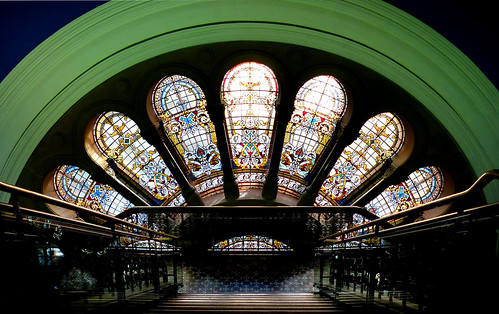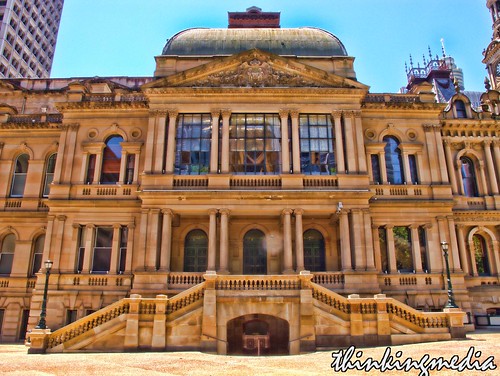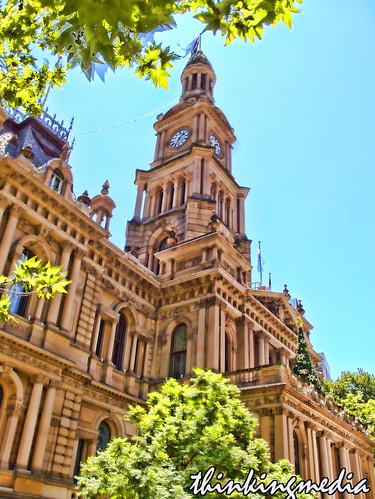Sydney Town Hall
Sydney Town Hall is a grand historic heritage building serving the same function today as when it first opened

The historic Sydney Town Hall has served as the working centre of civic government in Sydney ever since it's completion in the late 1800s. In addition to council chambers and civic offices it also has venues that are used for a wide range of events and exhibitions throughout the year. In fact it was Sydney's largest indoor entertainment venue until the Sydney Opera House opened in 1973.
After the incorporation of Sydney in 1842 the need for a civic town hall became evident. Sydney's aldermen were determined to make Sydney's Town Hall a grand building and were prepared to invest accordingly. The site that was selected was previously a burial ground that had fallen into disrepair. In 1868 a design competition was awarded to architect J.H. Wilson.
Construction of the Town Hall took place in two stages over a period of 21 years between 1868 and 1889 interspersed with more than its fair share of complications and scandals. The main building material was sandstone quarried from nearby Pyrmont. The design appears to be strongly influenced by French Architecture from the 2nd Empire. The exterior of the Hall is dominated by it's impressive clock tower.
One of the most notable features of Sydney Town Hall is its Grand Organ located at the end of the elegant Centennial Hall. No expense was spared in it's creation. Constructed in England in between 1886 and 1889, it was subsequently dismantled and carefully packed into 94 crates for shipping to Sydney Town Hall where it was carefully unpacked and reassembled. With 9000 pipes, it was the world's largest ,and possibly the best organ ever built when it was completed. Eventually time took its toll and the organ underwent a painstaking restoration that took over 11 years to complete finishing in 1982. Today the Grand Organ receives rigorous maintenance and it is regularly played for concerts and recitals throughout the year.
You can see the exterior of the Town Hall at any time of day or night, however access to the interior is limited to normal business hours unless attending an event. Tours are conducted by Friends of Town Hall for a small donation.
Nearby attractions: Queen Victoria Building, Sydney Tower, Pitt Street Mall, Darling Harbour and Hyde Park
Facts For Your Visit
Fee: No. Guided tours by donation are available after pipe organ concerts. Some events have admission fess.Sydney Town Hall Hours:
Opening hours may differ on holidays
- Monday: 8:00 AM – 6:00 PM
- Tuesday: 8:00 AM – 6:00 PM
- Wednesday: 8:00 AM – 6:00 PM
- Thursday: 8:00 AM – 6:00 PM
- Friday: 8:00 AM – 6:00 PM
- Saturday: Closed
- Sunday: Closed
Address: 483 George St, Sydney NSW 2000, Australia
Phone: (02) 9265 9333
Official Website: Sydney Town Hall
Sydney Town Hall Reviews
Rated out of 5![]()
![]() Sydney Town Hall is an impressive historic building with beautiful architecture. perfect for sightseeing. The area can get quite crowded, which makes taking photos a bit tricky, but it’s still worth a visit. There’s also a tram station nearby, making it a convenient spot to explore.
Sydney Town Hall is an impressive historic building with beautiful architecture. perfect for sightseeing. The area can get quite crowded, which makes taking photos a bit tricky, but it’s still worth a visit. There’s also a tram station nearby, making it a convenient spot to explore.
Punnatorn Vechaputi - 4 weeks ago
![]() Went there for the organ concert at Sydney Town Hall. The Grand Organ sounded great, with the music carrying clearly throughout the Centennial Hall. It’s a beautiful venue, and the performance offered a nice, resonant sound experience. Definitely a worthwhile visit.
Went there for the organ concert at Sydney Town Hall. The Grand Organ sounded great, with the music carrying clearly throughout the Centennial Hall. It’s a beautiful venue, and the performance offered a nice, resonant sound experience. Definitely a worthwhile visit.
D W - a week ago
![]() Sydney Town Hall is one of those buildings that still feels grand the moment you step off the pavement and look up. The sandstone facade pulls your eye to the clock tower, and the steps out front make a natural meeting point before you drift inside. The foyer sets the tone with polished marble, sweeping staircases and stained glass that shifts color through the day. Even if you only have a few minutes between trains, it is worth ducking in to let the city noise fade and take in the sense of occasion.
If you manage to see Centennial Hall, the scale is impressive. High ceilings, ornate plasterwork and rich timber turn any event into a bit of theatre. The heritage pipe organ sits like a crown at one end and gives the room a presence even when it is silent. Acoustics carry speeches clearly, and during concerts the sound blooms without becoming harsh. Public exhibitions and civic ceremonies rotate through the calendar, so on some days you walk into a quiet historic space and on others you step into a full house with a buzz of conversation. Staff are welcoming and happy to answer quick questions about the building’s history or point you toward open areas when events are on.
Practicalities are well covered. Entrances face George Street and the Town Hall Arcade, lifts run to all public levels, and clear signage keeps foot traffic moving. Town Hall Station is directly underneath, which makes it one of the easiest heritage sites in the city to reach without a car. Toilets are clean, water fountains are easy to find, and there are plenty of nearby options for coffee or a quick lunch. If you are pairing it with a short walk, the Queen Victoria Building sits across the road and Hyde Park is a few blocks east. Whether you drop in for five minutes or linger for a performance, Sydney Town Hall delivers a satisfying mix of history, craftsmanship and everyday usefulness.
Sydney Town Hall is one of those buildings that still feels grand the moment you step off the pavement and look up. The sandstone facade pulls your eye to the clock tower, and the steps out front make a natural meeting point before you drift inside. The foyer sets the tone with polished marble, sweeping staircases and stained glass that shifts color through the day. Even if you only have a few minutes between trains, it is worth ducking in to let the city noise fade and take in the sense of occasion.
If you manage to see Centennial Hall, the scale is impressive. High ceilings, ornate plasterwork and rich timber turn any event into a bit of theatre. The heritage pipe organ sits like a crown at one end and gives the room a presence even when it is silent. Acoustics carry speeches clearly, and during concerts the sound blooms without becoming harsh. Public exhibitions and civic ceremonies rotate through the calendar, so on some days you walk into a quiet historic space and on others you step into a full house with a buzz of conversation. Staff are welcoming and happy to answer quick questions about the building’s history or point you toward open areas when events are on.
Practicalities are well covered. Entrances face George Street and the Town Hall Arcade, lifts run to all public levels, and clear signage keeps foot traffic moving. Town Hall Station is directly underneath, which makes it one of the easiest heritage sites in the city to reach without a car. Toilets are clean, water fountains are easy to find, and there are plenty of nearby options for coffee or a quick lunch. If you are pairing it with a short walk, the Queen Victoria Building sits across the road and Hyde Park is a few blocks east. Whether you drop in for five minutes or linger for a performance, Sydney Town Hall delivers a satisfying mix of history, craftsmanship and everyday usefulness.
Le Hoang Giap - 3 months ago
![]() We just attended a concert at Sydney Town Hall and were blown away. Such a stunning building — the Victorian architecture, sandstone carvings, stained glass, and grand interiors are beautifully preserved, yet the hall also feels modern and functional. The acoustics were outstanding, making the performance truly special.
It’s amazing how much history lives within these walls, and lovely to see the City has kept its character intact. An absolute jewel in the heart of Sydney — perfect for concerts, history lovers, or anyone who appreciates heritage buildings.
We just attended a concert at Sydney Town Hall and were blown away. Such a stunning building — the Victorian architecture, sandstone carvings, stained glass, and grand interiors are beautifully preserved, yet the hall also feels modern and functional. The acoustics were outstanding, making the performance truly special.
It’s amazing how much history lives within these walls, and lovely to see the City has kept its character intact. An absolute jewel in the heart of Sydney — perfect for concerts, history lovers, or anyone who appreciates heritage buildings.
Daniel Ryken - 2 months ago
![]() Sydney Town Hall, perched prominently on George Street, is an enduring civic landmark steeped in history. Built in two main stages between 1869 and 1889 on the former Old Sydney Burial Ground, it showcases a commanding Second Empire Victorian design and was constructed with local sandstone.
Approaching from the grand façade and ascending its broad sandstone steps (a popular rendezvous point), visitors enter a high‑ceilinged vestibule adorned with ornate mosaics, columns, and chandeliers. Inside, Centennial Hall is breathtaking: its grand organ—once the world’s largest—boasts nearly 9,000 pipes and the rare 64‑foot Contra Trombone stop. The richly decorated woodwork, stained‑glass windows, and historic plaques underscore the hall’s role as the place of democracy and cultural events across generations.
While guided tours are not currently offered, the building’s grandeur speaks for itself. It remains operational as a government venue, concert hall, and event space, yet retains much of its original interiors after more than 130 years.
Looking ahead, the upcoming **Town Hall Square** project promises to transform the public space fronting the building into a verdant, pedestrian-friendly plaza.🚧 With construction slated to begin in 2028, the square will redefine how locals and visitors engage with this heritage site.
Combining historic gravitas with evolving civic life, Sydney Town Hall offers a richly layered and unforgettable experience—an architectural jewel and community centre wrapped in one.
Sydney Town Hall, perched prominently on George Street, is an enduring civic landmark steeped in history. Built in two main stages between 1869 and 1889 on the former Old Sydney Burial Ground, it showcases a commanding Second Empire Victorian design and was constructed with local sandstone.
Approaching from the grand façade and ascending its broad sandstone steps (a popular rendezvous point), visitors enter a high‑ceilinged vestibule adorned with ornate mosaics, columns, and chandeliers. Inside, Centennial Hall is breathtaking: its grand organ—once the world’s largest—boasts nearly 9,000 pipes and the rare 64‑foot Contra Trombone stop. The richly decorated woodwork, stained‑glass windows, and historic plaques underscore the hall’s role as the place of democracy and cultural events across generations.
While guided tours are not currently offered, the building’s grandeur speaks for itself. It remains operational as a government venue, concert hall, and event space, yet retains much of its original interiors after more than 130 years.
Looking ahead, the upcoming **Town Hall Square** project promises to transform the public space fronting the building into a verdant, pedestrian-friendly plaza.🚧 With construction slated to begin in 2028, the square will redefine how locals and visitors engage with this heritage site.
Combining historic gravitas with evolving civic life, Sydney Town Hall offers a richly layered and unforgettable experience—an architectural jewel and community centre wrapped in one.
Md Nazmul Hasan Sarker - a month ago
![]()
Directions
| Train Line | Nearest Station | Walking Time |
|---|---|---|
| L2, T1, T2, T3 or T4 | Town Hall | 0 minutes |
How to get to Sydney Town Hall by Train
By Train or Light Rail L2: Exit at Town Hall Station and you are there.
Map & Instant Route Finder
Click&Go Map and Route Finder with public transit, walking, driving or cycling directions. Get up-to-the-minute transit times for your route.
Accommodations near Sydney Town Hall:
Photo Gallery
-

Interior of Centennial Hall inside the Sydney Town Hall with the Grand Organ along the far wal -

The renowned Grand Organ inside the Sydney Town Hall cc licensed photo by Newtown grafitti -

Sydney Town Hall at Christmas cc licensed photo by sv1ambo -

Photo Credit: Bernard Spragg - cc license via Flickr -

Photo Credit: Bernard Spragg - cc license via Flickr -

Photo Credit: Sydney Heritage - cc license via Flickr -

Photo Credit: Sydney Heritage - cc license via Flickr




